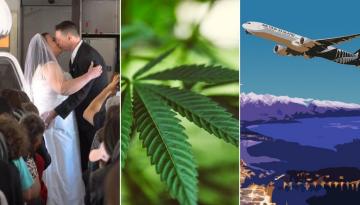
Air New Zealand is making hundreds of its remaining cabin crew members redundant as the COVID-19 pandemic rages on.
"It's heartbreaking. It's basically everyone with under 25 years of service, gone," one crew member who had just been told the bad news said to Newshub.
On top of the 385 staff who were given notice in September, Air NZ has confirmed it's ending a furlough arrangement it had in place with 550 cabin crew.
In documents sent to Newshub, staff were given a timeline of when any changes would take place. The documents say that feedback from both unions and employers would be considered up until October 14 and that in the week of October 27, the airline would "notify impacted employees".
Staff were informed as part of the consultation process that any crew who were employed after the Multi-Union Collective Agreement (MUCA) would be made compulsorily redundant, while those on older, pre-MUCA contracts would essentially be made redundant on a 'last on, first off' basis.
The airline has confirmed that around 4000 employees have lost their roles since the start of COVID-19, a figure which includes the 550 international cabin crew on furlough.
Air NZ's chief operating officer Carrie Hurihanganui said September's schedule reductions as a result of a decline in passenger demand on international routes, meant the airline had to look at reducing its number of employees.
"Air New Zealand entered into consultation with the remaining international cabin crew around further reductions. Our international schedule remains largely limited by border restrictions and unfortunately there is not enough flying to provide sustainable rosters for the number of international cabin crew we have," Hurihanganui said.
"That consultation has now completed and we have confirmed we will be going ahead with the reduction of around 385 full time equivalent roles.
"Due to the terms of our two different collective contractual agreements for international widebody crew, in order to action those redundancies, we now also have to wind up a furlough arrangement with around 550 international cabin crew who finished working in the business in July.
"We are working closely with our unions to see if there is a different way we can provide these crew with a pathway back to Air NZ."
Employee union, E tū says the cuts are "appalling" given the airline plays a vital part of New Zealand's international trade routes and has received hundreds of millions of dollars of public money this year.
International cabin crew on the 777 and 787 fleets have been worst hit by the lay-offs at Air NZ, with 85 percent of them losing their jobs, according to E tū
In a statement, E tū says there are two groups affected by these latest redundancies: the existing 787 crew who will lose their jobs just before Christmas and furloughed crew who lost their jobs back in July.
Hundreds of crew opted for a company's furlough scheme whereby instead of collecting their redundancy pay-out, they went on leave without pay in the hope that when flying restarted they might be able to return and regain some employment benefits.
"Because of the scale of the company's cuts some crew on furlough may now lose any hope of returning to work," says E tū head of aviation, Savage.
"Trust between cabin crew employees and Air NZ is at an all time low due to those 2013 attempts to decrease terms and conditions, and subsequent attempts to lessen crew working standards. When COVID-19 hit, 787 crew were looking at possible strike action after protracted CA negotiations had failed to address their poor rates of pay."
Despite the job cuts here in Aotearoa, the airline is understood to be keeping the 58 Chinese nationals who work for the airline in Shanghai.
This has not been well received by the workforce's union.
"The Shanghai base has always been about paying crew less and devaluing the role of cabin crew. Outsourcing is a barrier to raising standards in aviation and it needs to end," E tū head of aviation, Savage, said in September.
But the airline says these workers must be Chinese due to employment laws in China, and that none of the Shanghai-based crew are currently working.
"Our Shanghai crew base is contracted to Air NZ through Foreign Airlines Service Corporation (FASCO), which is a government agency in China. It is a requirement of the Chinese authorities that Chinese nationals are hired through this organisation. However, Air NZ considers and has always treated these crew as Air New Zealanders," Hurihanganui said.
"None of our 58 Shanghai-based crew are currently operating, nor have been since February this year. Our Shanghai-based crew are currently stood down on a furlough-type arrangement with FASCO. These flights are currently being operated by our New Zealand-based cabin crew."


